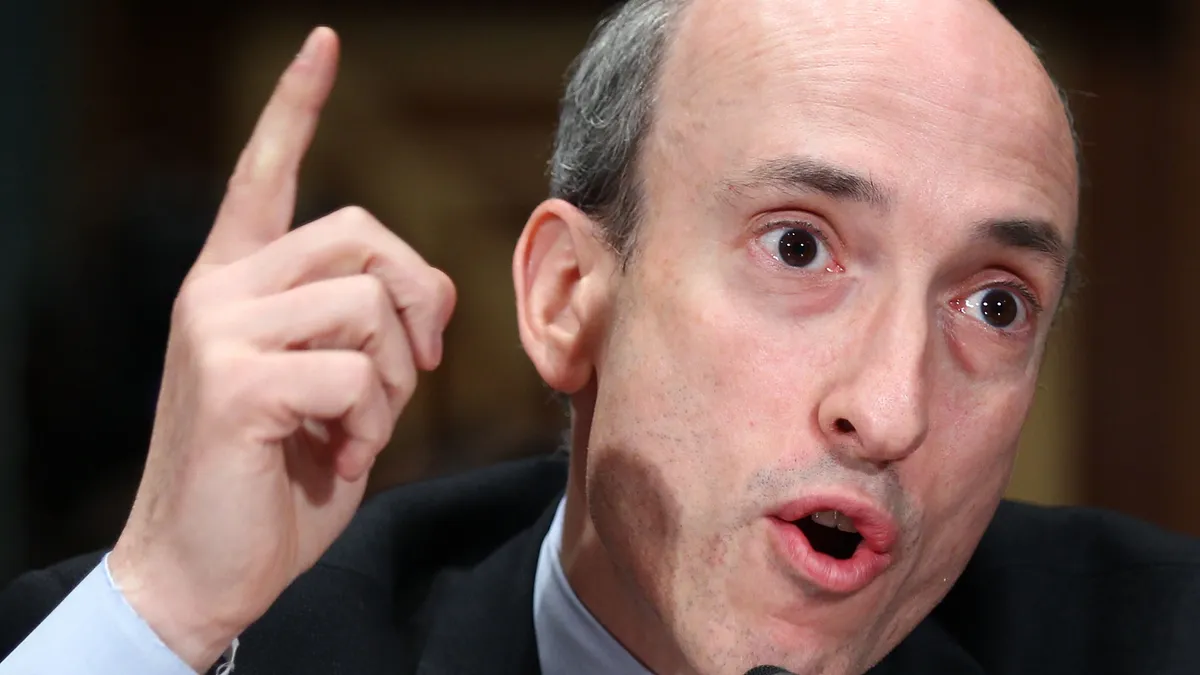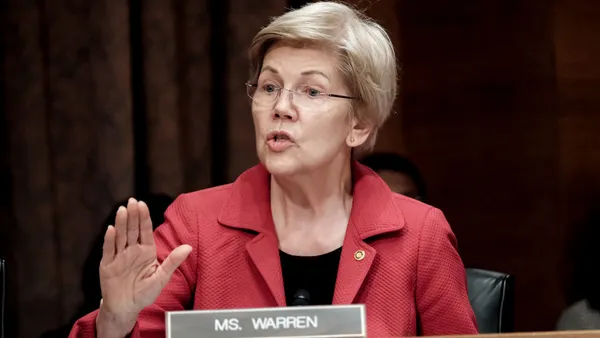Dive Brief:
- The Securities and Exchange Commission (SEC) on Friday solicited public comments on digital engagement practices used by broker-dealers and investment advisers, including social networking tools; games, streaks and contests with prizes; points, badges, leaderboards, visual cues and celebrations for trading; curated lists and ideas suggested to clients when orders are placed; and the use of chatbots to connect with customers.
- Such an invitation for feedback — this one lasts 30 days — usually signals that an agency is gearing up to draft new rules meant to guide behavior in the industry, or determine whether those behaviors can be governed under existing ones.
- "While new technologies can bring us greater access and product choice, they also raise questions as to whether we as investors are appropriately protected when we trade and get financial advice," SEC Chairman Gary Gensler said in a press release. "In many cases, these features may encourage investors to trade more often, invest in different products, or change their investment strategy."
Dive Insight:
At issue is whether prompts or celebratory messages from online brokerages persuade customers to make more trades — and if those trades result in poorer portfolio performance. Secondarily, a question remains as to whether the SEC should consider such prompts as formal investment advice or recommendations.
Gamification has come under fire from several regulators, in close association with companies whose mission it is to simplify investing to attract a broader client base.
"Increased retail participation in our capital markets is unequivocally a good thing, and we are happy to see the SEC recognize those benefits in its request for information," Robinhood said Friday in a statement, according to Bloomberg.
The company has seen a number of regulators take its practices to task over the past year. Massachusetts’ securities regulator filed a complaint in December alleging Robinhood seeks "continuous and repeated engagement" by encouraging customers via email alerts to make trades, using in-app prompts to push customers toward higher-risk investment products, and sending users messages adorned with emojis prompting them to buy additional shares.
Regulators alleged Robinhood allowed customers to sign up on a waitlist for early access to a new cash-management feature, and that users could move toward the top of the list by tapping a fake credit card in Robinhood’s app up to 1,000 times a day.
The complaint also castigated Robinhood’s practice of celebrating trades with digital confetti. The company curtailed that animation after Gensler, while still a nominee to lead the SEC, called it out at a hearing in front of the Senate Banking Committee.
Robinhood is hardly the only company in the SEC’s sights. eToro and Public Holdings, for example, use social-networking features that let investors follow other users’ activity or copy their portfolios.
"Gamification is neither good nor bad, and we should support companies leveraging technology to help investors build better investing and savings habits," Stephen Sikes, Public.com’s chief operating officer, said in an email seen Friday by The Wall Street Journal.
Gensler, in a Friday video on Twitter, likened the recommendations of online brokers to the suggestions Netflix, for example, uses as part of its user algorithm.
"If we watch a movie that a streaming app recommends and don’t like, we might lose a couple of hours of an evening," he said. "Following the wrong prompt on a trading app, though, could have a substantial effect on a saver’s financial position."
Digital engagement practices, Gensler said in Friday’s press release, are designed to increase revenues, data collection or the amount of time customers spend on the app, which may present a conflict between the platform and the user.
The SEC in 2019 began requiring brokers to avoid placing their own interests ahead of a client’s. Massachusetts, the following year, passed a fiduciary rule that stipulates a broker-dealer has a duty to make recommendations that prioritize customers’ interests independent of those of other parties.
Some of those parties are high-speed trading firms — and the gray area is: High-speed traders are clients, too. Robinhood sells its clients’ orders to those firms in a practice called payment for order flow, which represented 81% of the company’s revenue in the first quarter of 2021, according to the Financial Times.
Gensler told Barron's in an interview Monday that a full ban on payment for order flow is "on the table."
Robinhood in December agreed to pay the SEC $65 million to settle charges that it failed to disclose until 2018 that it engaged in payment for order flow. The Financial Industry Regulatory Authority (FINRA) in June ordered the company to pay nearly $70 million to settle allegations the company misled customers and approved ineligible traders for risky transaction types.
Hardy Callcott, a partner at Sidley Austin who specializes in securities enforcement, told The Wall Street Journal the SEC and FINRA "could provide more guidance about where they think the line is" regarding what constitutes an individual recommendation. "People have ideas now that wouldn’t have been feasible 20 years ago," he said.
Gensler told the House Financial Services Committee in May that the SEC may need to update several trading rules to reflect new technology.












